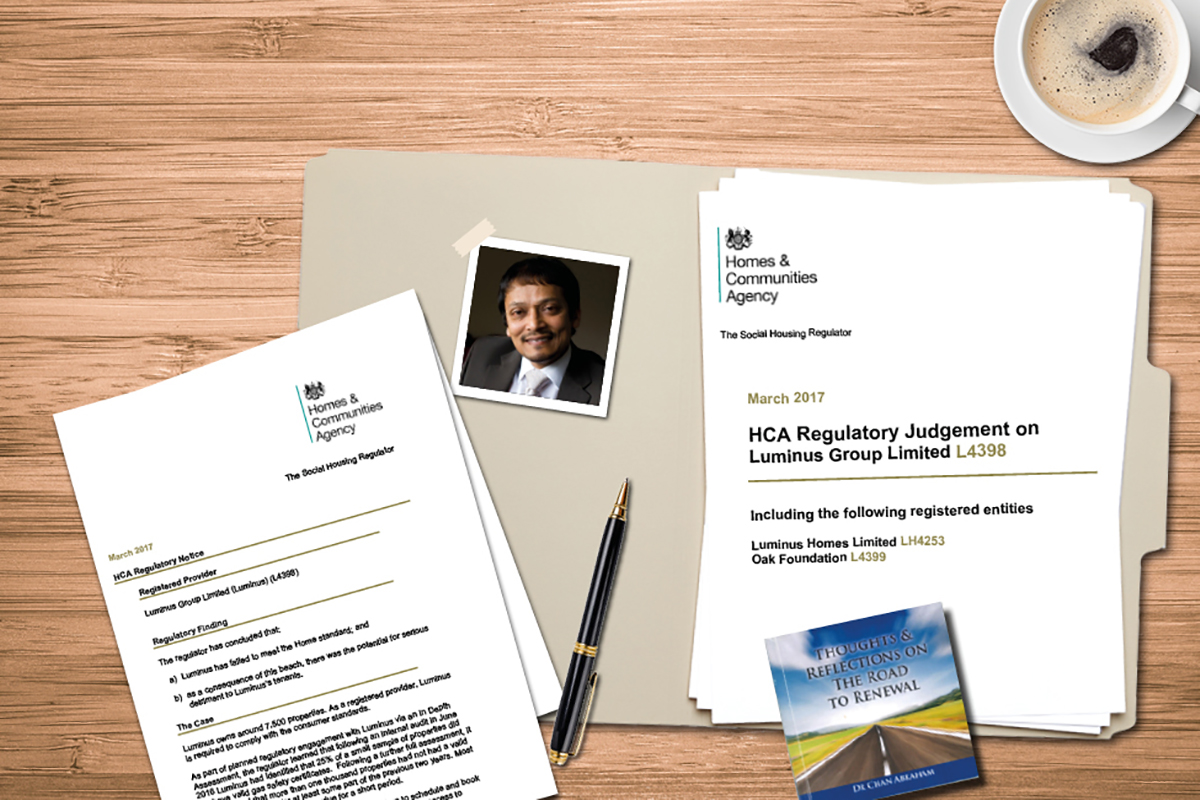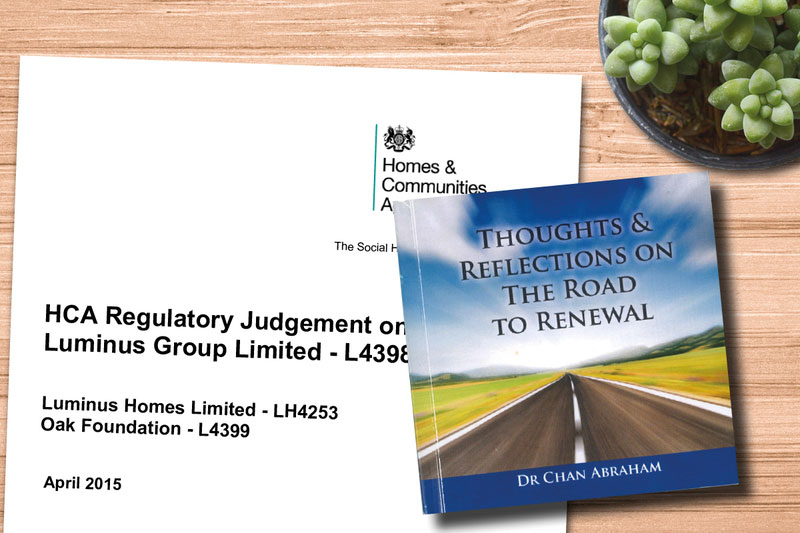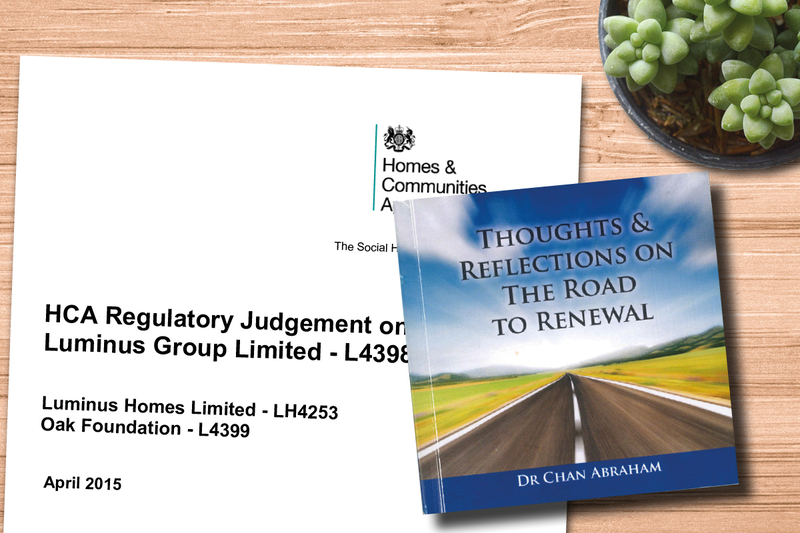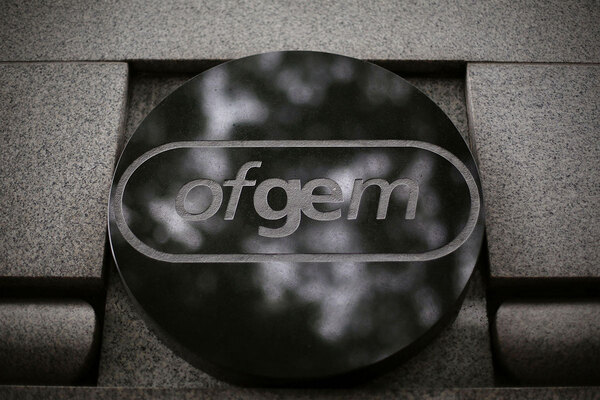You are viewing 1 of your 1 free articles
Luminus: into the light
Luminus is one of the housing sector’s most unusual players. Pete Apps finds out whether recent regulatory problems might demystify the Cambridgeshire landlord
Huntingdon, Cambridgeshire
“What’s the worst that can happen? And then what? Shackle your fears, murder your anxieties and drink the elixir of celebration that you are alive!”
These are the words of Dr Chan Abraham, chief executive of housing association Luminus and by some distance the sector’s most enigmatic figure. They are published in his 2014 pocket book, Thoughts & Reflections on the Road to Renewal – a selection of quotes from sources as diverse as Confucius, Rosa Parks, Pele and The Bible, but mostly Dr Abraham himself.
On the back cover, the blurb says the book is “for anyone wanting to live with hope and inspiration in the face of the modern world’s slide into mediocrity and cynicism”. It claims that Dr Abraham is “recognised as one of the 21st century’s key advocates for a renaissance of leadership in business, government, politics and faith communities”.
These are lofty claims for the leader of a 7,500-home stock transfer housing association which reported a £6.5m deficit for 2015/16 and is currently non-compliant with the regulator’s basic standards for governance. But they will not come as much of a surprise to those who have followed Dr Abraham’s career.
Face of the brand
For more than 17 years he has led Luminus from its office in the Cambridgeshire town of Huntingdon. If the organisation’s publicity is to be believed, over that time it has been delivering a quasi-spiritual service to Huntingdon’s social housing tenants. Its mission statement, or “2020 Vision”, is to “change the world where we are” by mending aspects of “broken Britain”. According to the statement, it has “energised residents, business partners and the wider community to develop a sense of purpose, hope and fulfilment”.
But in March this year, housing regulator the Homes and Communities Agency (HCA) took a dimmer view of its record. Luminus, it said, had allowed more than 1,000 properties to languish without a valid gas certificate for at least some period over the past two years. Considering the number of properties affected and the systemic nature of the problem, the HCA said this was a breach of its Home Standard and exposed tenants to the risk of serious harm.
The regulator also came down hard on the organisation’s governance generally, ranking it non-compliant and deploying unusually severe language.
“Luminus does not have an effective system of internal control,” it said. “Material weaknesses in the information and material presented to the board have not been effectively challenged… The regulator has concluded that board members of Luminus are not discharging their duties with adequate skill.”
The association had previously received compliant G1 (for governance) and V2 (for viability) gradings after regulatory assessments in February 2016 and April 2015. Its governance had been downgraded to a compliant G2 in August 2013, with the HCA saying it needed to improve its treasury management. This prompted an angry response from Luminus, which accused the HCA of basing its judgement on “factual inaccuracies”.
So between Luminus’ own self-promotion and the regulator’s stinging criticism, what is the truth about Huntingdonshire’s largest housing association?
Given that he has imprinted his personality so firmly on the organisation, any discussion about Luminus is inevitably also a discussion about Dr Abraham. The company’s founding father is certainly an interesting figure. He started his career working for the Greater London Council in “one of the most violent areas of London” in the 1970s, aged just 17.
From there, he moved through several public sector jobs, finally becoming director of community services at Huntingdonshire Council. In 2000, the council transferred its housing stock to Huntingdon Housing Partnership, the company he founded, which later became Luminus. This, he feels, was divine power at work.
“It wasn’t difficult to get the local politician’s approval. ‘It’s your neck on the block’,” he later told the Church Times in an interview about the stock transfer process. “But the tenants voted for the scheme, too. I would say it was a guiding power at work. I prayed all the way through.”
Dr Abraham is a man who apparently does not fear accusations of self-promotion. Luminus has regularly advertised itself in the media, with its chief executive’s image front and centre, sometimes sponsored by his consultancy Leadership International. In one instance, in 2007, it pictured his face carved on Mount Rushmore alongside other Luminus staff.
In the office, he runs the famous Luminus staff conferences, giving inspirational talks, leading staff in a salute known as the ‘Luminus wave’ and once – in an infamous incident in 2009 – slipping from the stage and cutting himself quite seriously after impaling his leg on a pole. (He later issued a news update on his health to staff “to give people the reassurance that their leader had not been taken away from them”.)
Dr Abraham is also the chair of Daybreak Community Church - a Pentecostal church registered to the Luminus head office, which had income of £24,800 last year, according to the Charity Commission website. Its founding documents say its number one aim is to “advance the Christian faith” and Dr Abraham is joined on its board by another Luminus board member, Janet Boston.
In addition, Dr Abraham has had a busy recent career in Huntingdon. According to Companies House, he has had relatively recent directorships at more than 30 companies in and around the town. The Companies House website says he remains a director at seven, three were dissolved in October last year, and he resigned from 15 on 16 March 2007.
In a statement, Luminus says it has over time “appointed board and executive members to manage discrete parts of the business”, with some created in the early 2000s “to protect the Luminus brand”. Many of these went dormant in 2007, which explains the 15 resignations. Six of Dr Abraham’s current directorships remain on Luminus subsidiaries and the other is a registered charity unconnected with the organisation.
Alongside the issues raised by the regulator, the organisation has a history of some local disputes with residents – many of them fairly unexceptional – the most notable being a long-running saga over its plan to demolish sheltered accommodation in the village of St Ives, and replace it with extra care accommodation.
In 2014, Luminus settled a County Court claim with one of the residents for just over £5,000 after previously denying her compensation payments for the loss of her home.
Claims that it had ‘pressurised’ other older tenants into not accepting payments were not upheld following an independent investigation commissioned by the local council in 2014.
Commercial investment
In its judgement, the HCA was emphatic about the organisation’s governance. “The board is unable to explain compellingly how financial and governance arrangements operate effectively within the group’s legal and governance structures,” it said.
Several sources, at least one with direct knowledge of the organisation, had raised concerns to Inside Housing about the suitability of Luminus’ board members, their experience of social housing and their ability to hold executives to account. As the regulator’s current regulatory system places a great deal of reliance on boards’ ability to scrutinise and manage their own affairs, the make-up of Luminus’ board is worth a look.
“The board is unable to explain compellingly how financial and governance arrangements operate effectively within the group’s legal and governance structures.”
HCA statement
Before recent changes, the list of members published on Luminus’ website was not exactly flush with housing sector experience. Luminus’ chair is Michael Forrest, director of studies at a local grammar school. Its highest paid member – receiving £4,125 for his services in 2015/16 – was David Vessey, a parish councillor and technical advisor to an electrical accessories company.
The rest of the board contained three accountants, a medical doctor, a former deputy leader of Huntingdonshire District Council, a reverend and a tenant board member who has worked as a railway controller, and Dr Abraham himself.
By contrast, Cross Keys Homes – a similar sized organisation based in nearby Peterborough – is chaired by the former chief executive of a government regeneration agency with wide experience in the housing sector. The rest of its board includes a director at a large Birmingham-based housing association, the former mayor of Peterborough who has significant housing experience, a housing consultant with substantial local authority experience, and two accountants.
There has been recent progress, however. Since the regulatory downgrade, Luminus has appointed three new board members with “sector-specific experience in governance, finance and treasury management and organisation design”. Sue Lock, former chief executive of Wulvern Housing Association; John Simpson, former chair of Sovereign Housing Association and former chief executive of Den Norske Bank; and Martin Tiplady, a senior non-executive at Midland Heart, have all joined the board. The organisation said its governance is being “comprehensively reviewed” and said it “continues to work closely and co-operatively with the HCA”.
It is understood the regulator was extremely dissatisfied with Luminus’ governance after it issued the judgement and planned to exert pressure by holding the organisation’s grading at a non-compliant G3 until changes were made to allow the board to operate effectively.
In its judgement, the HCA also flagged a mysterious £48m “commercial investment” in an external property development company, made through an intermediary.
“The board has not demonstrated it properly understands the risks and benefits of this investment, and whether it is delivering Luminus’ objectives,” the HCA said. “The board does not receive sufficiently detailed information to allow it to effectively monitor and make decisions on the investment, and has not effectively challenged that situation.”
This financing arrangement remains a mystery, with Luminus declining to release details of what the money was for or to which company it had been loaned. It does not appear in the accounts of Luminus, or its subsidiaries, which cover the accounting period ending March last year. The loan is likely to have been made outside this period.
“The board has not demonstrated it properly understands the risks and benefits of this investment, and whether it is delivering Luminus’ objectives," HCA
The board was also criticised by the HCA for its failure to prevent or report the gas safety failings, the biggest of their kind by a housing association in recent years.
According to the HCA, at least 1,000 properties were without a valid gas safety certificate – each instance breaching the Gas Safety (Installation and Use) Regulations 1998. The Health and Safety Executive (HSE) said a breach of these regulations could result in a substantial fine and/or a custodial sentence. So far, all Luminus has faced is the regulatory notice from the HCA, but following complaints by a local councillor, the HSE stepped in. Details of the case were passed to one of its inspectors in March.
Luminus says that all its homes are now compliant with statutory gas safety requirements, following a “comprehensive review of policy, procedures and systems”. It says that to prevent the issue recurring, appointments are being booked eight weeks in advance with “a dedicated helpline” set up to assist tenants.
While some progress is being made then, this was clearly necessary given the scale of the regulator’s concerns. With no date yet set for regrading, however, it may be best to steal another pearl from the words of Dr Abraham: “Choosing to change could be the doorway to a new way of living.”
Related stories















